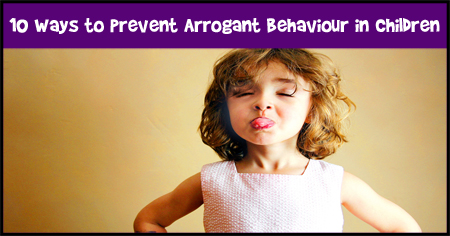Arrogance is pretty common in kids. Helping your child overcome this attitude at an early age will help you raise a confident and strong adult. Read on to find tips for preventing arrogant behaviour in children. There is a hairline difference when it comes to distinguish confidence, pride and arrogance. Initially, parents feel that their child is smart, is aware of self-esteem and succeeds at almost everything he or she gets into. There is no doubt that if your child believes in himself or herself, he or she will have good moral, emotional and academic development.
If confidence turns into arrogance, your child will be deprived of the real happiness in life. There is a lot you can do as a parent to nurture your child’s life and help her become the best he or she can be. Encourage your child to focus from inside out and help him or her become a confident adult.In this article
Tips to Help Prevent Arrogant Behaviour in Kids
Have a look at the tips for preventing
arrogant behaviour in kids.
1. Be a Role Model for Your Child
Children do what they see their parents doing. If you boast yourself often, you are definitely going to find your child doing the same. Be a role model for your child and act modestly. Listed below are some tips for being a good role model for your child.
- Model Kindness – Be kind and loving to your child. Talk softly and talk with courtesy. Never scream or yell at your child for petty mistakes. Make him or her understand his or her mistakes in a loving manner.
- Adopt a Positive Approach – It is very important to take things positively. Whenever there is some mishap or problem, teach your child to look at the positive side. Teach him or her that getting frustrated or angry is not the right way to deal with the problem.
- Be Down-to-Earth – It is very important to be down-to-earth for parents in order to prevent superiority complex in children thereby preventing arrogance in them.
- Be Helpful – It is necessary to model helpfulness to reduce arrogance in children. Teach him or her to be helpful whenever possible. Being helpful can be very useful in reducing arrogance in children.
- Inculcate Values – Inculcating values in a child can not only reduce the arrogance in your child but also help him or her to grow-up into a good human being. Inculcate good values through the way you conduct yourself.
2. Teach Your Child to Accept Failure
Teach your child to accept failure, learn and then grow. Many life lessons are learned in this way. So, do not come in the way of stumble to prevent your child from failing. Here are some ways that you can follow.
- Encourage Growth Mindset – It is necessary to encourage growth mindset in order to help children accept failures. Growth mindset encourages children to accept failures and learn from them and work towards success.
- Boost Happiness – Teach your child to be happy even when he or she fails. Teach him or her that he or she has at least tried to work towards success and failures are a part of life. So, being upset or sad may not help. It is necessary to embrace failures and continue to work hard in order to attain success.
- Teach that Failures Lead to the Solutions – It is essential to teach children that failures lead to the solutions. When children fail it is necessary to encourage them to find right solutions for attaining success instead of yelling at them.
- Teach them that Failures Make Brain Stronger – Teach children that they should never stop doing the good things that they are doing by fearing failure. Let them know that failures make their brain stronger.
3. Celebrate your Child's Success in Limit
You may get surprised and happy knowing that your child has accomplished milestones or achieved some skill faster than others. It is good to celebrate, but avoid overdoing it. This will lower the value of real and big achievements.
4. Avoid Praising your Child too Much
If you find that your child is performing excellently or has some outstanding talent, do not praise too much. Appreciate his or her skills and encourage him or her to sharpen that ability so that she understands that there is a lot more to be improved.
5. Stop Your Child from Bragging
If you find that your child is often boasting about her achievements and feels very high of himself or herself, talk to him or her. Let him or her understand that there are many children with different abilities and there is nothing exclusive about that.
- Bragging is Bad – Teach your child that bragging is a bad habit. They should never brag about themselves. Tell them that bragging is something that others should do for them.
- Don’t Brag Yourself – Never brag in front of your children. Children are good at imitating. When children see their parents bragging, they too learn to do the same.
- Boost their Self-Esteem – Teach children that children with high self-esteem and self-respect never brag about themselves. Find different ways to boost self-esteem and self-respect of children.
- Teach them Right – All children love to share their accomplishments and about the good gifts that they. However, it is necessary to teach children to share them in the right way. They can ask their parents to share such achievements and accomplishments the right way.
6. Let Your Child Take Challenges
Well, this does not mean that you encourage your child to challenge everyone she comes across his or her talent. This is important because maybe your child is a frog in a well. Let him or her face like a small fish in a big pond. This will help your child improve and grow and perform better in every field. Leaving the comfort zone and taking a step outside will also make your child realize and hence there will be no arrogance in his or her nature.
- Be a Role Model – Teach your children the right and healthy ways to deal with challenges. Teach him or her to take things positively. Tell your child that challenges are a part of life and it is necessary to always learn to overcome such challenges without harming or hurting anyone.
- Be Your Child’s Support System – Teach your child to remember one thing that you will always be his or her support system when challenges come his or her way. When children have a good support system, they will never fear accepting challenges.
- Encourage Stress Management – Stress is a part of challenges. Therefore, it is a must for parents to teach various stress management techniques. Meditation and deep breathing are some of the best stress management techniques that you can teach your children.
7. Provide lot of Positive Support
You should be clear, specific and consistent when setting the limits for your child. Make sure you do not tolerate
aggressive behaviour under any circumstances.
8. Keep Your Child Engaged in Different Activities
Engagement is very important for everyone, especially a young child. Make sure your child is not overloaded, but keeping him or her engaged in problem solving sessions or brainstorming games will help him or her focus confidence in the right path. Here are some games which can help you to keep your child involved.
- Building Blocks
- Stacking Toys
- Chess
- Puzzles
- Nature Scavenger Hunt
- Pretend-Play
- Story-Telling
- Memory Games
- Number Games
- Dice Games
9. Support Your Child and Skills
Avoid criticism because mere blame is not going to help your child. Come up with some option for your child and help him or her come out of the aggressive behaviour.
10. Correct Your Child's Behaviour
Kids learn eventually - this is a mere excuse because your child will follow the same
behaviour pattern as he or she grows if not corrected right now.
11. Teach Your Child to Avoid Taking Things PersonallyThe moment children start taking things personally arrogant behaviour starts developing in them. Therefore, it is very important to teach children to avoid taking things personally. Taking things personally can really spoil the happiness of your child. So, the most important thing that you can teach your child is to stop taking things personally.
12. Teach Anger Management TechniquesTeaching simple anger management techniques at an early age can really help children in the long run. With anger management techniques they can learn to manage anger easily which can surely prevent arrogant behaviour in them. Listed below are some simple things that you can teach your child when he or she feels angry.
- Avoiding the Situation – When your child is feeling extremely angry and irritated, teach him or her to avoid the situation immediately.
- Taking Deep Breaths – Deep breathing is one of the useful techniques for teaching children to control their anger. Ask your children to practice deep breathing when they feel angry or irritated.
- Thinking – Teach your children that it is always better to think before acting. Encourage your children to think about the consequences of getting angry unnecessarily.
- Getting into Other’s Shoes – It is necessary to teach children to consider the feelings of others. They should know how to get into other’s shoes. By understanding the feelings of others one can easily control anger.
- Being Safe – It is crucial to help children understand that they are risking their safety by getting angry. In anger a person can lose control over their senses and as such he or she can put himself or herself in danger.
- Setting Rules – Children should know their boundaries and they must always stick to the rules. By knowing their boundaries as well as by knowing the difference between right and wrong children can learn to be in their limits and control their anger.
- Learning to Forgive and Forget – It is necessary to teach children to forgive and forget. Forgiveness is one of the important virtues that parents can inculcate in their children. Forgiveness is a road towards peace and by learning to be peaceful children will get angry less often.
13. Help Them Learn the ConsequencesArrogant behaviour can have very poor consequences on the growth and development of children. In order to help children, avoid arrogant behaviour it is necessary to help them learn about its consequences. Listed below are some of the consequences of arrogant behaviour.
- Feeling of Dislike – An arrogant behaviour can give rise to the feeling of dislike among other children. If a child behaves arrogantly, he or she will not be liked by people around her.
- Lack of Friends – Arrogant children lack friends. Because of their arrogant attitude children may not like to befriend the arrogant child.
- Lack of Helpers – No one would like to help a person who is arrogant by nature. Therefore, when a child is in trouble, he or she may find it difficult to find a person who can help him or her.
- Lack of Empathy – No one feels empathy for a child who is arrogant. As such when a child is facing any problem, he or she will have to solve it on his or her own because no one will feel empathic enough to offer help to him or her.
- Stress and Tension – Being arrogant can increase stress and tension which can affect the growth and development of the child. Stress and tension may give rise to various illnesses and cause developmental problems in children.
- Feeling of Loneliness – Arrogant children have very few or no friends. Lack of friends increases the loneliness of children. Lonely children may feel depressed and less active.
- Lack of Happiness – Arrogance can invite negativity in a child's life. Due to arrogance children and other individuals in the child’s life may start avoiding him or her which may give rise to sadness in the child's life.
Teach your child to be happy with what he or she has so that she gets the true happiness in life. If your child wants to achieve more in life, teach him or her importance of hard work and honesty.
What are the causes of arrogant behaviour in children? How to prevent arrogant behaviour in children? What are the ways to deal with arrogant children? Discuss here. 






























